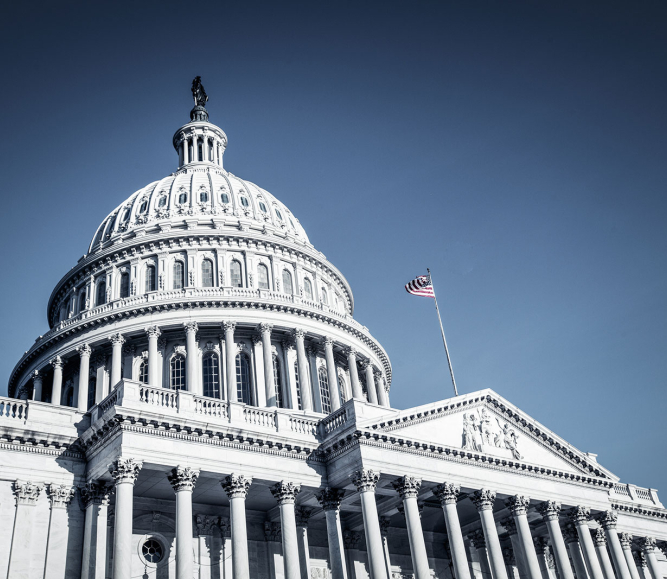County Leaders Visit Washington to Share Local Perspective on Budget Reconciliation
Upcoming Events
Related News

Elected officials from five states sound alarm about administrative and funding changes to SNAP and Medicaid
WASHINGTON – Today the National Association of Counties (NACo) joined five state associations of counties in supporting over a dozen county leaders visiting Capitol Hill to advocate for county priorities in two key aspects of budget reconciliation legislation. Local elected officials from Minnesota, Missouri, New York, North Carolina and Wisconsin met with leaders in both the House and the Senate to express concerns about the impacts on counties of proposed Medicaid reforms and administrative and funding changes to the Supplemental Nutrition Assistance Program (SNAP).
“As essential intergovernmental partners, the voices of county leaders must be heard as members of Congress navigate the budget reconciliation process,” said NACo Executive Director Matthew Chase. “When it comes to Medicaid and SNAP, all counties have a significant stake in the outcome of this process, and we need to communicate our concerns here in Washington.”
Proposed administrative and funding changes to the SNAP program would reduce federal assistance for both administrative and benefit costs while also expanding work requirements, a change that furthers the administrative burden on states and counties. In House bill H.R. 1, the tolerance threshold for payment errors would also be reduced to zero, creating an even greater administrative burden. While SNAP cost shifts impact all counties, the impact is especially significant for counties in the 10 states where counties administer SNAP benefits (including fly-in participants from Minnesota, New York, North Carolina and Wisconsin). In these states, county administrative costs will increase by well over 30% per year even as the federal benefits share declines.
Proposed Medicaid reforms could similarly increase the financial and administrative burden on counties, threatening a longstanding federal-state-local partnership to provide healthcare for residents. Among other impacts, proposed reforms would increase the number of uninsured residents by 10.9 million by 2034, significantly raising uncompensated care costs for counties, many of which operate as providers of last resort through public hospitals and emergency services. Much like SNAP, navigating proposed work requirements for Medicaid recipients further increases the administrative cost for counties.
“Across both these issues – Medicaid and SNAP – counties are seeking to communicate that the shift in responsibilities and costs to local governments will make our residents less healthy and less food secure,” said Chase. “With counties already hard pressed to provide services for all eligible residents, these cost shifts increase county administrative costs, including requiring more staffing, while serving fewer residents. Ultimately, they force local governments to compromise in other areas and pass along financial burdens to residents in the form of reduced services and increased property taxes.”
The fly-in comes as the Senate reviews proposed text for its version of the reconciliation bill. The bill previously passed in the House last month, and a modified Senate version is expected to pass in the coming weeks. As written, the legislation imposes on counties a double burden of increased costs and reduced federal support.
Said Chase, “Local leaders are here to tell their members of Congress what these cuts and reforms will look like when the rubber meets the road.”
For more information about county priorities in budget reconciliation, click here. For more information about counties and Medicaid, click here. For more information about counties and SNAP, click here.
Media Contact

Jessica Hartl
Advocacy
Senate Agriculture Committee releases reconciliation budget text; Contains changes to SNAP
On June 24, the Senate parliamentarian approved a new version of the benefit cost share provision. Under this revision, states may use either their FY 2025 or FY 2026 payment error rate to determine their required match for FY 2028. For FY 2029 and beyond, the match is based on the payment error rate from three fiscal years prior.

Related News

National Association of Counties Launches Initiative to Strengthen County Human Services Systems
The National Association of Counties (NACo) announces the launch of the Transforming Human Services Initiative, a new effort to help counties modernize benefits administration, integrate service delivery systems and strengthen county capacity to fulfill our responsibility as America’s safety net for children and families.

HHS Secretary Kennedy touts fixes for obesity, chronic illness, mental health issues
Counties can help improve health outcomes by prioritizing prevention over treatment, Robert F. Kennedy Jr., secretary of the U.S. Department of Health and Human Services told NACo Legislative Conference attendees.

Congress seeking ‘common-sense solutions’ to unmet mental health needs
Rep. Andrea Salinas (D-Ore.): “Right now, it is too difficult to access providers … and get mental health care in a facility that is the right size and also the appropriate acuity level to meet patients’ needs.”